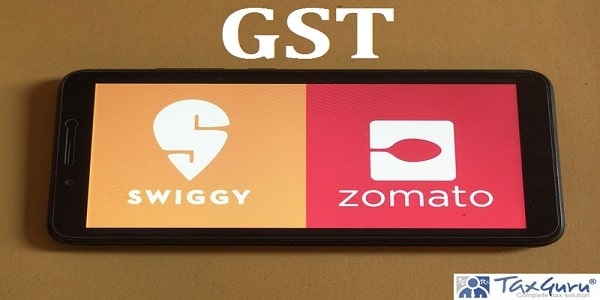GST on Zomato, Swiggy Orders – Impact On Customers, Restaurants And Food Delivery Platforms?
GST Council in its 45th GST Council Meeting held on September 17th, 2021 at Lucknow, has decided to charge GST at the rate of 5 % on cloud kitchens and food delivery platforms like Swiggy, Zomato, etc on restaurant services supplied through them with effect from 01.01.2022 and the tax will be charged at the point of delivery.
Until Now, food delivery platforms used to collect GST from customers and gave it back to the restaurants. After receiving GST from them, restaurants had to pay the tax to the government. Once the changes are implemented with effect from 01.01.2022, the food delivery companies will collect the tax from customers and deposit it directly to the government on behalf of the restaurant.
Department noticed that this system in place is confusing and even led to the evasion of taxes. Restaurants used to collect taxes but did not pay the taxes to the department.

Food delivery platforms collect TCS on GST at the rate of 1 % on the taxable value of supplies made by restaurants through them and deposit it with the department. The department found a huge gap between the taxable value reported by Food delivery platforms in TCS return filed, and the taxable value reported by restaurants in their returns.
Revenue Secretary Tarun Bajaj said “Analysis – of returns filed by delivery apps and some Haryana restaurant services – showed the gap in taxable turnover for suppliers where TCS was deducted by a delivery app was greater than turnover declared by such suppliers. The evasion amount is believed to be substantial as food delivery apps have high supply volumes”
Impact on customers:
This new rule will have no impact on customers as there is no extra and no new tax. This new rule has only led to change in the point where tax will be collected. Customers will continue to pay GST at the same rate of 5 % as they used to pay earlier.
Impact on restaurants and food delivery platforms:
This new GST rule will impact small restaurants, especially the ones having an annual turnover of less than Rs 20 lakh, as these restaurants were earlier not required to be registered under GST.
Also, after this new rule, there will be an additional compliance burden on most restaurants, as they will have to maintain two separate accounts — one for their regular business done and the second for the business done through Zomato or Swiggy.
As for food delivery platforms, this will also add more burden of compliance towards collecting and depositing taxes on behalf of the restaurants and maintaining additional records.






We were a small fast food outlet listed on Swiggy. We were not registered on GST. Swiggy was not charging any GST from our customers till 31.12.2021.
Please check our MOU.
It was signed when the customers were not required to pay any GST under section 9(5).
No where in the contract you have defined the term GROSS.
Govt imposes 5% GST under 9 (5).
The Customer pays 105 on order worth 100. He pays extra 5 to be deposited by Swiggy to the Govt as tax for the service he used.
Swiggy is supposed to collect this tax and deposit it with the Govt. Swiggy has to act just as a collector of the Tax here. Restaurant is nowhere involved.
Zomato understands it well & behaves as per this logic.
Now see what Swiggy does.
Suo moto, without any information at all, it includes this Rs 5 in the Restaurant Income. Charges its Commission of about 30% on 105 thus pocketing Rs 1.5 in the process and deducting this 1.5 from Restaurant to compensate the Govt.
And it further charges me 18% GST on this 1.5 Rs steal !!
Kindly reply on Logic, on Professional Ethics and on Legal Validity of this Practice being followed by Swiggy.
Regards.
Rajinder Goyal
Ph 7973934342
No option for me to attach file. Kindly reply to this mail so that I can send you the Swiggy MOU and Statement of Account.
I am GST Officer working in Mumbai zone. You can email the details you have and we will take the action of required as per applicable law
we are doing tiffin section from home having regd.gst and taking orders from zomoto and swiggy. our annual turnover was 2 to 3 lakhs. how much tax we had to pay and does we take input from our purchases materials
we are doing tiffin section from home having regd.gst and taking orders from zomoto and swiggy. our annual turnover was 2 to 3 lakhs. how much tax we had to pay and does we take input from our purchases materials. plz reply sir
Eg.: If our restaurant, have the sale of 3,00,000 from our own (restaurant/takeaway/delivery) and 1,00,000 sales from Zomato & Swiggy. How do we have to file in GST1 & 3B?
We have Online food ordering platform service for restaurants, But we are not doing food supply to the customers, restaurants will do their own. we will taking only order from customers. Will it applicable us to pay GST ? Please advise us
Yes,You are right and I hope that in GST council recommendation certain amendments will be made in CGST act and rules made thereunder and most probably the exemption given will be taken back by making exception list for supplies made through ecommerce operator ,but ,considering the current situation and mostly when resturant business already suffers much it will one more needle in pain by increasing compliance burden of small resturant operator who has some hope with online delivery platform , but ,hope that it should be applicable only for GST registered resturant and not for all ,by the way some time ago I placed an order with online food platform and they add Rs.5.36 in final bill,reflected as taxes collected by Resturant & on others (18% on delivery ) ,so it seems collected only on GST registered Resturant and not for all.
Can you explain why the small unregistered restaurants have to get registered under GST ?
My analysis is as follows?
As per Section 22 only the person crossing the threshold limit of Rs. 20/10 Lakhs are required to get registered.
As per Section 24(ix) persons who supply goods or services or both, other than supplies specified under sub-section (5) of section 9, through such electronic commerce operator who is
required to collect tax at source under section 52.
Hence, if a restaurant is not registered under GST and does not cross the threshold limit of Rs. 20 lakhs why would I be required to take registration as Section 25(ix) itself gives an exemption to the restaurant. The words ”other than supplies specified under sub-section (5) of section 9” gives an exemption to small restaurants.
Please give suitable clarification if I am wrong.
Hey! Please let me know as well. As a small cloud kitchen business on Zomato, do I need to get my business registered?